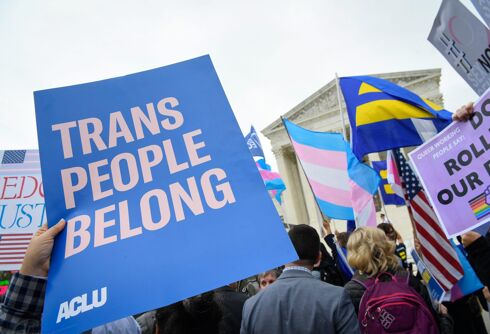Yesterday, the American Civil Liberties Union of South Carolina announced that they are filing a lawsuit against heavy restrictions on gender-affirming care in the state owing to a recently passed bill.
“A law that takes away healthcare from people, that strips away the ability of parents to make medical decisions for their children, that criminalizes doctors who follow the established standards of care isn’t just mean-spirited and harmful – it’s also unconstitutional,” said Jace Woodrum, Executive Director of the ACLU of South Carolina. “Transgender South Carolinians should be able to get the medical care they need without politicians coming into their doctors’ offices with them. That’s why we’re challenging this dangerous law.”
Related:
Trans-affirming medical providers face increased stress & risk as states ban trans health care
“The waitlist is what keeps me up at night,” one doctor in Minnesota – which has seen an increase in people from red states seeking care – said.
The lawsuit concerns H.B. 4624, a total ban on gender-affirming care for minors that also restricts care for adults by removing gender-affirming care from the state Medicaid plan and by prohibiting the use of public funds for this care.
Stay connected to your community
Connect with the issues and events that impact your community at home and beyond by subscribing to our newsletter.
This ban led to the Medical University of South Carolina (MUSC), the only public, statewide hospital system in the state, shutting down their gender-affirming care treatments, leading to many people being forcibly removed from their gender-affirming care plans.
The plaintiffs and their lawyers argue that, because the restrictions only apply to transgender people’s gender-affirmign care and are not implemented broadly, it constitutes discrimination against transgender individuals and thus is a violation of the Fourteenth Amendment, the Affordable Care Act, the American Disabilities Act, and the Rehabilitation Act. The Fourteenth Amendment’s Equal Protection Clause requires government impartiality, while the other three laws ban discrimination in various areas, including in health care.
A primary part of the argument is that there is no legal justification for the bans and that they are the result of an ideological slant by lawmakers in the state. The complaint references how organizations like the World Professional Association for Transgender Health and the Endocrine Society back gender-affirming care. It also discusses the harms that this ban would do to those who are currently seeking out or undergoing gender-affirming care in the state, likely forcing them to move to another state.
They reference the harm this would do to the plaintiffs, who include both adult and minor transgender individuals. This includes forcing them to go off of their gender-affirming care, being forcibly detransitioned, being unable to afford treatment, and being forced to undergo a puberty that they don’t want to. One plaintiff even is having his surgery delayed because of MUSC’s shutdown, which is causing additional financial and potentially physical harm.
The ACLU is seeking out relevant temporary and permanent injunctions against the defendants and H.B. 4624, a waiving of fees for the plaintiffs, and for the costs and expenses of the plaintiffs to be covered.
South Carolina House Majority Leader and bill sponsor David Hiott (R) said to Live 5 News shortly after the bill was passed, “When God created us, he created us male and female, and that’s it. There is no other choice, and all these other folks that want to change that from birth or change that through their life, we need to stand up against that.”
“I feel so lucky and fortunate to be supported and affirmed by so many wonderful people who accept me for who I am,” said plaintiff Sterling Misanin of Charleston, South Carolina, in a written statement.
“My family continues to be extremely supportive of me living as the man that I am. In Charleston, I have a wonderful community who make me feel safe and seen. But the actions by MUSC have caused me significant harm, and I am devastated that my state has interfered in my access to life-saving health care. I am an adult, and I know myself better than my state does, and I cannot stay silent about the very real harms that this law inflicts on transgender people like me.”
A spokesperson for the state attorney general said to The Guardian that they decline to comment but “will vigorously defend the state’s laws.”
The plaintiffs in the case include Sterling Misanin, Jane Doe, Jill Ray, Nina Noe and her parent Nancy Noe, Grant Goe and his parent Gary Goe. They are represented by attorneys from the ACLU and Selendy Gay. The defendants include the state attorney general, the Department of Health and Human Services in the state, the Public Employee Benefit Authority, the President of MUSC, and the Board of MUSC.
Don't forget to share:














